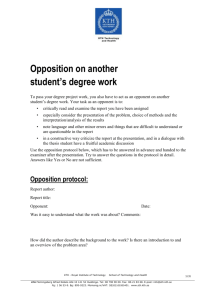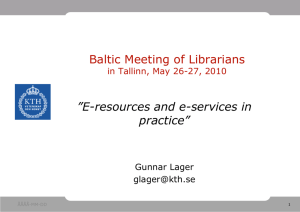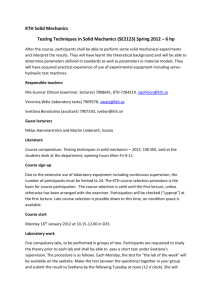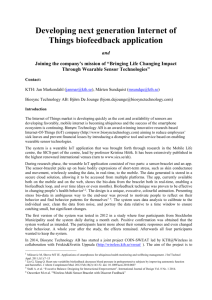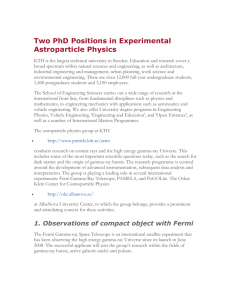Research on Information and Comm. Technologies
advertisement
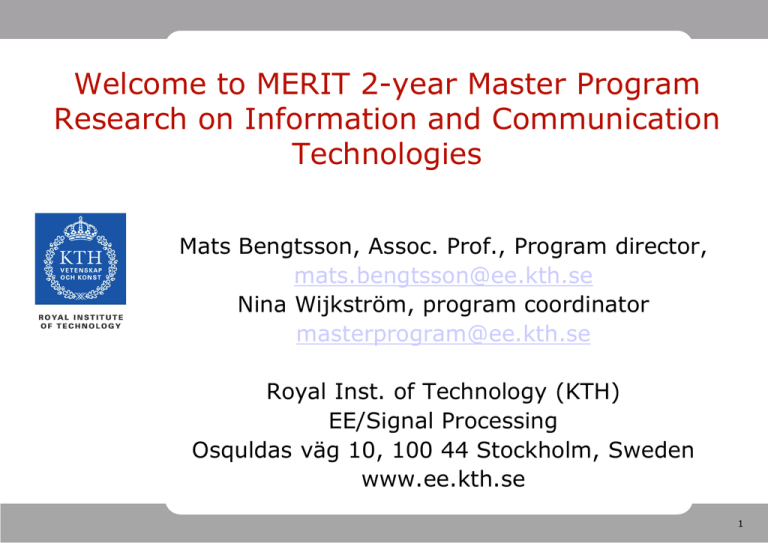
Welcome to MERIT 2-year Master Program Research on Information and Communication Technologies Mats Bengtsson, Assoc. Prof., Program director, mats.bengtsson@ee.kth.se Nina Wijkström, program coordinator masterprogram@ee.kth.se Royal Inst. of Technology (KTH) EE/Signal Processing Osquldas väg 10, 100 44 Stockholm, Sweden www.ee.kth.se 1 Welcome to KTH KTH, the Royal Institute of Technology Excellence in Education, Research and Entrepreneurship 2 Sweden 3 Stockholm 4 Schools at KTH • • • • • • • • • • Architecture and the Built Environment Biotechnology Chemical Science and Engineering Computer Science and Communication Education and Communication in Engineering Sciences Electrical Engineering Engineering Sciences Industrial Engineering and Management Information and Communication Technology Technology and Health 5 School of EE Organization Automatic Control Communication Theory Communication Networks Microsystem Technology Signal Processing Sound and Image Proc. Fusion Plasma Physics Plasma Physics Electromagnetic Engineering Electric power systems Industrial information and control systems Electrical machines and power electronics 6 Some EE Figures • • • • • • ~130 faculty and researchers, ~195 PhD students 35 MEuro turn-over (85% of activity is research) EE B.Sc. program with ~370 students M.Sc. Programs, ~490 students – – – – – – – Wireless Systems Electrical Power Engineering Systems, Control and Robotics Network Services and Systems Electrophysics Smart Electrical Networks and Systems Research on Information and Comm. Technologies • ~130 Exchange students, mostly European 7 Signal Processing and Communication Theory Labs 8 Research at Signal Processing Lab • Communication using multiple antennas • Fundamentals in estimation and detection theory • Modelling of radio communication channels • Navigation • Measurement technology • Medical signal processing • Vehicle based moose detection • … 9 Research at Communication Theory Lab • • • • • • • • Fundamentals in Information Theory Coding theory Joint source and channel coding Control with communication constraints Sensor networks Distributed source coding Relaying, cooperative communication Network coding 10 ACCESS Research Centre • Autonomic Complex Communication nEtworks, Signals and Systems • Brings together researchers from three schools at KTH • “Distinguished Lecture Series” • Monthly open seminars, by top class international researchers • • • Broadcast live Recorded lectures on the web Next seminar: Sept. 4, 15:00 in M2 • www.access.ee.kth.se 11 KTH campuses in Stockholm KTH Campus Valhallavägen KTH Syd, Campus Telge KTH IT University, Kista 12 Campus Valhallavägen (EE school–most courses) 13 Campus Kista (ICT school – some courses) 14 Educational Structure at KTH 5 years from 2007? 15 The MERIT Program • One of the first 19 Erasmus Mundus programs selected in the first call 2004 • KTH joined the consortium 2010 • Offers 9 tracks in 3 Areas of Knowledge (AoK) • Tracks at KTH: • • • • Information Transmission and Wireless Communication Systems (with UPC, UCL) Wireless Network Management (with PdT) Multimedia Signal Processing (with UPC, UCL) Photonics (with KIT) • Synergy with local KTH master programs: • Wireless Systems • Photonics • Networked Services and Systems 16 Curriculum, Degree Requirements • 90 cr.u. courses + 30 cr.u. degree project • 60 cr.u. first university + 60 cr.u. second university • Recommendation for study plan: 1st,2nd Semester (60 ECTS) 3rd Semester (30 ECTS) 4th Semester Core Concentration Transversal 21 to 30 ECTS 18 to 33 ECTS 6 to 12 ECTS 18 to 24 ECTS 6 to 12 ECTS Master Thesis (30 ECTS) • KTH “requirement”: AK2036 Theory and Methodology of Science 17 Finding Information • Main MERIT web: www.meritmaster.org • Course lists for your track, see email • Programme page at KTH Social: www.kth.se/social/program/tiktm/ • Mailing list merit12@ee.kth.se Use for education related issues (Mats and Nina are on the list). • Read your KTH email! • Academic advisors at KTH: Mats Bengtsson: Info. Trans. & Wireless Comm., Wireless Netw. Management Urban Westergren: Photonics • General MERIT administrative issues: merit@tsc.upc.edu • KTH administrative issues: masterprogram@ee.kth.se 18 The Academic Year • Academic year divided into 4 quarters (”perioder”) • Credit units (”poäng”): 1 week = 1.5 cu, 1 semester = 30 cu 19 Organization of teaching • Voluntary: Lectures, Tutorials, Help Sessions, (Homework), … • Mandatory: Exams, Labs, Projects, (Homework),… • Exams: Usually written. The ECTS grading system is used. Passing grades: A (highest grade), B, C, D, E. Failing grades: FX (possibility to get passing grade if you do some extra assignment), F. • Students who fail an exam must take re-examination. Typically, exams for a course are given twice per year. • Honor code: Academic dishonesty taken very seriously at KTH • Folder with info on: rules for written exams, students’ responsibilities 20 More on the Course Selection • Hand in study plan as soon as possible to Nina with Cc: to Mats/Urban. Preferably this week! • Check time tables + travel time between campuses • Course code IK****=Kista Campus (Exception: IK2507 at main campus) • Some courses offered jointly to PhD students extra demanding! • Swedish courses (optional!!!): •On-line “SWELL” •Class-room (limited space in fall semester) •Consider AK1213 Swedish Society, Culture and Industry in Historical Perspective as an alternative 21 Thesis Project • Perhaps the most rewarding part of the program • Within the general topic of your track • 30 credits (20 weeks) • Carried out in industry or at the university (same requirements!). Within your 2nd study year country. • Student's own responsibility to find a project! • Grade: A-F 22 Thesis Project, Requirements • • • • Must have taken >60 credits from the program to start In principle, can be done any time during 2nd year Must have taken relevant courses Thesis work at KTH requires •Written report, approved by your supervisor and the examiner •Oral presentation at KTH, approved by KTH examiner •Attend two other presentations at KTH •Act as opponent on another student's presentation 23 Practicalities • Course material • Buy yourself! • • Main text book – at book store Often extra compendiums, … sold at the lab • Time tables • At main Campus: 8-10 means 8:15-9:00+9:15-10:00 • At Kista Campus: 8-10 means 8:00-8:45+9:00-9:45 • Separate access cards at Kista campus! • Photonics students: Meet with Urban Westergren, Friday August 24, 9:00, in Kista! 24
